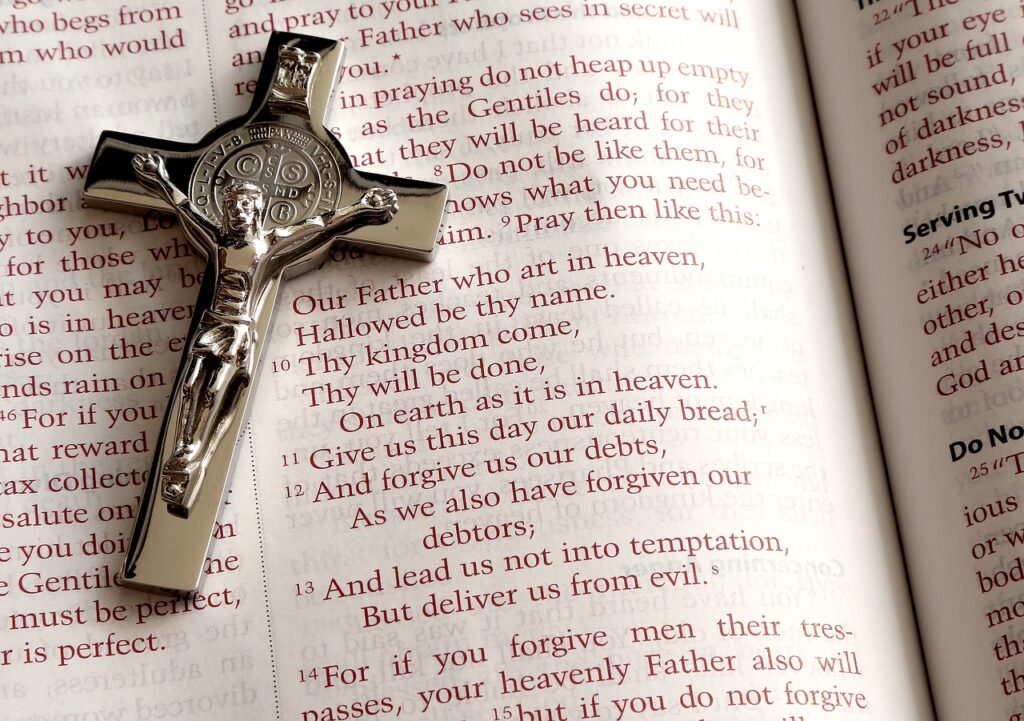The Lord’s Prayer is a central Christian prayer that Jesus taught us as the way to pray. Jesus is uniquely the son of the Father. He has a unique relationship with him. Keep in mind that as we pray this prayer he taught us, we are given the privilege to share in that intimacy with God. Let’s take a deeper look at the meaning behind this prayer that is prayed millions of times per day. What are we asking for when we pray this prayer?
Teaching on Prayer
In Matthew 6:5-15 and Luke 11:1-13, Jesus teaches his disciples how to pray, providing an example of a prayer that they should use as a model. This prayer is commonly known as the Lord’s Prayer.
Our Father
The Lord’s Prayer begins by addressing God as “Our Father in heaven” (Matthew 6:9, Luke 11:2), emphasizing God’s paternal relationship with his children and his sovereignty over all.
Importance of Hallowing God’s name
Jesus teaches that the first petition, “Hallowed be your name,” is essential, as it acknowledges God’s holiness and sets the tone for the rest of the prayer (Matthew 6:9, Luke 11:2). What we are asking for is that we always hallow the name of God. To hallow, to hold as holy, that means to set apart. May we always consider God a value so supreme that every other value by comparison simply falls away. When Gods name is held holy as hallowed, then all the other interests and values find their place around that central value.
Seeking God’s Kingdom
The second petition, “Your kingdom come,” emphasizes the importance of seeking God’s reign and will in one’s life (Matthew 6:10, Luke 11:2). That is the heart of Jesus’ preaching. When he first appears in the hills of Galilee, what’s on his lips is the message of the kingdom. “The kingdom of God is at hand, so repent and believe the good news.” Jesus is the kingdom in person. The kingdom of God means God’s reign, God’s way of ordering things. For centuries Israel longed for this, that the God who made the world, who created the human race and wanted us to be his priests and his prophets and his followers. That world has fallen into sinful disarray, and no earthly ruler could set it right. And so Israel begged, “Lord come. How long, oh Lord? When will you come to set things right?” Well, that’s God’s kingdom, God’s reign. How has it happened? It’s happened in him, in Jesus. He himself is the coming together of divinity and humanity. He himself is God’s justice and peace reigning on the earth. So, when we say, “May your kingdom come,” we’re saying, may we be drawn more and more completely into the power of Jesus. May this reign embodied in him become normative for me. That’s what we’re asking for every time we say, “Thy kingdom come.”
Providing for daily needs
Jesus teaches that God knows our needs before we ask and encourages his disciples to seek God’s provision for daily life, rather than stockpiling treasures on earth (Matthew 6:8, 31-34). “Give us each day our daily bread.” Now that sounds rather ordinary, but perhaps it is a bit more mysterious. The Greek behind this phrase is very strange. “Epiousion” is the Greek. It means literally, give us the “supersubstantial” bread. “Give us each day our supersubstantial bread.” Are we praying just for ordinary sustenance? We’re asking for the “Panem supersubstantialem,” the supersubstantial bread. What’s the Eucharist? Not ordinary bread, but bread that has been transubstantiated into the Body and Blood of Christ, no longer ordinary bread but now the Body and Blood of Christ under the appearances of bread and wine. We want to be fed, because we’re not just following a guru or a leader. We want to be drawn into him. How does that happen? Through the supersubstantial bread that we pray for every time we pray this prayer.
Forgive us our sins as we forgive those who sin against us
Jesus is a great teacher, of course. The Prince of Peace, of course. The one who’s established this new way of life. The most important thing that Jesus does is he forgives our sins. The forgiveness of sins is at the very heart of what Jesus is all about. Next we pray for the grace to forgive as you have been forgiven. In other words, it is to give away the grace that has been given to us.
Deliverance from evil
The final petition, “And lead us not into temptation, but deliver us from the evil one,” acknowledges humanity’s vulnerability to sin and asks for God’s protection and deliverance (Matthew 6:13, Luke 11:4).
Next time you pray this prayer, slow down and reflect on what it is we are really asking for when we pray the Lord’s Prayer. Peace friends.

